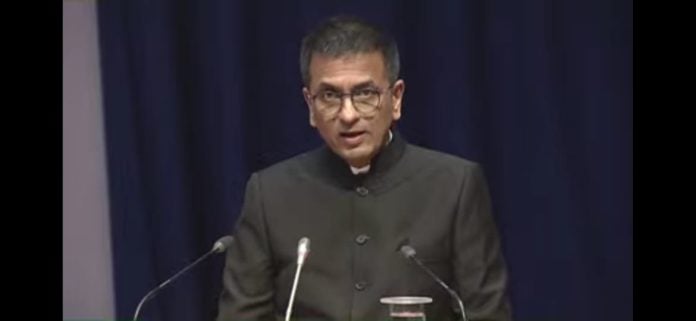Delay in undertrial cases leads to erosion of trust in justice delivery system: CJI Chandrachud
Chief Justice of India DY Chandrachud said on Wednesday that in India, the undertrials languished in prisons for longer duration as they could not cough up the funds required to pursue a case.
Speaking during the inaugural event of the new building of the Jharkhand High Court, the CJI said the presumption of innocence was a fundamental of criminal law jurisprudence.
As per CJI Chandrachud, the district judiciary needed to be at par with higher courts and they would augment the prestige of the citizens.
He said during his experience at the High Court, he knew the difference between justice and injustice, adding that delay in undertrial cases lead to erosion of trust in justice delivery system.
He stressed on the need to provide proper meals in courts and proper washroom facilities for women, pointing out that there were many courts, which did not have women washroom facilities.
The CJI said it was important to ask hard questions. He said that even now, the backward castes, marginalised classes, the Adivasis and tribal groups did not have proper land records and papers.
He said with the help of technology, the Supreme Court was aiming to take justice to the doorsteps of citizens. Stating that both the Supreme Court and High Courts conduct their business in English, he pointed out that almost 6,000 Supreme Court judgments have been translated to Hindi.
As per the CJI, the judiciary would be able to reach 6.40 lakh villages only when the judgments were accessible in regional languages. About 34000 Apex Court verdicts were available free of cost on the e-SCR portal, while live streaming has helped to take court proceedings to every nook and corner of the country, he noted.
He said the Union government has sanctioned a plan of Rs 7,000 crore for the third phase of the e-courts project.
While inaugurating the new building of the Jharkhand High Court, President Droupadi Murmu applauded the CJI for translating the verdicts of various courts in vernacular languages.
Speaking on the occasion, Union Law Minister Arjun Ram Meghwal said that when the first phase of e-courts came, the government stressed on infrastructure. The second phase was focussed on citizen-centric services, while the third phase would prove to be revolutionary. The country has adopted everything today, from special courts to alternative dispute resolution (ADR). It also had a 24×7 court for traffic violations, noted the Union Minister.
He stressed on the use of regional languages in the judiciary, stating that language connected the citizens.
Chief Minister Hemant Soren, Governor of Jharkhand C.P. Radhakrishnan and Chief Justice of the Jharkhand High Court Sanjaya Kumar Mishra, among others, were present on the occasion.


